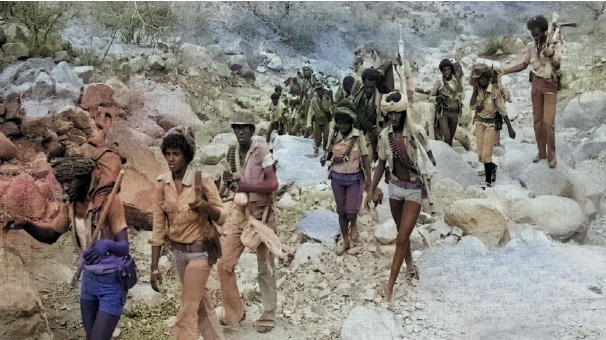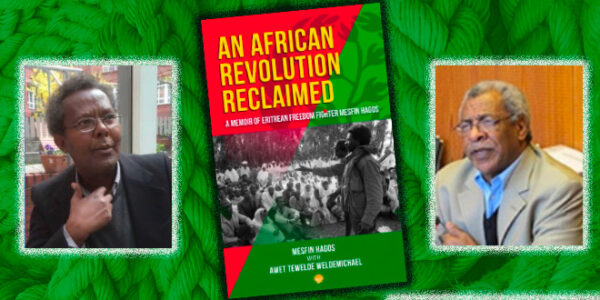Eritrea: How President Isaias Afwerki took everyone, including the Veteran Freedom Fighters, for a Ride

I aim to demonstrate not only how the former freedom fighters were misled, lied to, and exploited by the regime after independence, but also how their non-interventionist approach betrayed the very people they fought so hard to liberate from Ethiopian rule.
One of the most fascinating but confusing stories that ever unfolded in Eritrea is to do with the transformation of the members of the veteran freedom fighters’ community who gave it all during the armed struggle, but later, allowed docility to set in. And many analysts believe their docility is what spurred the president to run riot.
I believe we have reached a point in our history where we take a stab at the real issue that has been tripping Eritrea all along. Yes, we have reached a moment of truth to deal with the elephant in the room. That means we have to address the collective responsibility of the former fighters who failed to look after the needs of the people of Eritrea.
As I write this article my mind meanders through the streets of Asmara, the place of my birth, as it commemorates its 34th year of ‘independence’ this year.
My views on this independence celebration may not bear a cogent argument as far as the radical followers of the PFDJ (the government’s party) and those zealous nationalists who are blinded by regionalism are concerned; but I dare say that the proud and heedful Eritreans, who once strutted with puffed chests, are feeling the shame President Isaias Afwerki has brought upon Eritrea over the years. Yes, 34 years of utter tyranny has brought ill-repute and disgrace to our country.
Listening to the ageing president’s annual speech is a case in point. Every year the president takes to the stage to deliver his speech, which is customarily replete with blame-shifting, scapegoating, finger-pointing, and more. He is renowned for his generous dispensations of false-promises, deceptions, condemnations and subterfuges behind a facade of perceived moral superiority and righteousness.
In order to mask his choleric temperament, the president’s attempt to appear more knowledgeable and important than he genuinely is, was right on cue when he resorted to his usual lecture-like discourse on new global order, which was mostly focused on ‘blunders of Americanism’ – a subject matter on which he showed flaws in judgment. Thanks to his recklessness, Eritreans are now banned from entering the US.
In his speech he also mentioned ‘the faults of Ethiopia’s ethnic Federalism’, which was full of rhetoric, comments on the problems in Sudan that were accompanied by unfriendly provocations, and acts of subversion concocted against the people and the Government of Eritrea, a set of drearily familiar statements he conveniently added to fill gaps in his speech.
Of course, there was no mention of why the regime is still stuck in the past and unable to improve, for example, basic infrastructures after 34 years of his iniquitous rule.
Simply stated, there was no mention of the ‘real’ reality on the ground. Surely, no one expects him to deliver a speech on why Eritrea is a country where its citizens live in big-prison-like conditions – one that has created a fervent yearning for the youth to leave for good, why its diaspora is unwilling to return home, why thousands of its former freedom fighters have opted to seek asylum abroad, and why Eritrea is consistently ranking among the lowest-performing countries in various global indicators … and more. One can only surmise why he further undermined himself by his misdirected 34th independence speech.
In the beginning …
Putting the president’s speech aside, let’s focus on our former freedom fighters’ success, which, in due course, has turned into dicey docility for now.
We Eritreans still talk about how our fighters dedicated all of their energy, strength and youth to achieve the task they set out to accomplish – to capture Asmara and declare independence.
Indeed, they did manage to fulfil that dream categorically. Here it is important to mention that they achieved success due to the very support they received from the people; it was neither a matter of heroism only, nor divine intervention. It was the people’s backing that sustained them morally and materially during the struggle. Yes, we all witnessed the ‘people-factor’ that helped in shaping their mindset and, consequently, the outcome of the armed struggle.
In May 1991, after a long and arduous struggle, they rolled into towns. We were so intoxicated with joy and happiness, who knows how we eventually managed to come back to our senses after our frenzied festivities. The way the public welcomed and greeted them with great euphoria and enthusiasm has remained, without exaggeration, etched in our memories. Sadly, we didn’t know then that despondency was waiting for them around the corner.
Yes, what we were not aware of was what the post-independence era was going to lay bare – a different side to their resolute character. The ‘people-factor’ was out of the window as soon as they stabilised the situation and the president’s men began to take inventory of the spoils of war, including political and material.
After independence, one can say, the freedom fighters were still considered as our pride and joy, the country’s future guardian angels, and trusted to safeguard Eritrea from foreign and domestic transgressions. Unfortunately, the situation changed in no time; in a cruel twist of fate, Eritrea became theirs.
As Eritreans began to feel apprehensive about and restless with the new order – I am referring to the role the new ‘ruling class’ were playing – they had no choice but nurse that ‘providential hindrance’. In fact, when the new rulers began to throw their weights around and flex their muscles, I witnessed Eritreans simply rolling with the punches, and with resignation! As far as I am concerned, that is how life in independent Eritrea got underway. Our freedom fighters, I am saying this rather heavy-heartedly, were well on their way to becoming full-fledged rulers.
What really happened?
As soon as the independence festivities subsided, Isaias went to work to solidify his rule by surrounding himself with close and loyal allies who would preserve his position and propel him to become the future president of the country.
After he got what he wanted, he began to hand government positions around through the ‘spoils system’, and through that he began to effectively command attention of his expectant fighters while he gradually accrued power.
The responsibility of distributing the country’s assets was firmly in Isaias’ hands, and his spoils-system became the most effective tool to keep his comrades in check and in attendance. And one can also argue that the influence he exerted over them was mainly due to that very patronage. Soon, he had his target audience, even the ones who were considerably sympathetic towards the people’s plight, eating from the palm of his hand.
In retrospect, one could say the writings were already on the wall at the outset. I noticed the fighters turned their attention to their immediate wellbeing and needs which Isaias controlled. The future wellbeing of the country was being compromised as they began vying for the spoils of war – free accommodation, government jobs, government vehicles and other resources while civilians were, discriminatingly, being pushed aside in plain sight.
I witnessed our freedom fighters – our would-be guardian angels – switch off as they were busy gazing at their navels and imploring the ‘new king’ for windfalls and special considerations. Sadly, the public were thrown at the back of the queue to acquire government services. In fact, I can retrospectively argue that it is that very lapse which led to moral paralysis, which in turn prevented them from saving us from Isaias.
I need to make a confession here. I often catch myself wondering why they ended up becoming his enablers and making it possible for him to dominate us, the average public. Yes, I challenge myself to reflect on how President Isaias Afwerki took everyone, including the veteran freedom fighters, for a ride. I found the subject matter so engrossing it took me weeks to snap out of it. Actually, I am still going in circles to tie the loose ends.
I hope I will get my act together soon and align my thoughts to flow – allow them to come and go without me getting attached to them too much, or trying to control their flow, because I am the kind who finds it hard to avoid getting caught up in details.
Well, for now, I can only provide a brief and impulsive response. First, our case – the civilians – is straightforward. Although we are the majority, we were never part and parcel of the real Eritrean society. That is as far as the president and the president’s men are concerned. What about the ex-fighter community? The president made them part and parcel of his plan; or, at the risk of sounding really impulsive, part of his scheme, perhaps?
I know some of us do not shy away from apportioning criticism regarding Eritrea’s failures to the leadership. Perhaps we should change our approach by apportioning them fairly amongst all members of our society, especially the other protagonists … the ex-freedom fighters who enabled the president to operate unrestrainedly at all levels of our society. Yes, in the past we have glossed over the actual role the ex-fighters played in the management of our failing Eritrea through Isaias’ two-tiered system.
Isaias’ two-tiered System
Soon after the referendum, it was in full view that Isaias leveraged his particular advantage to successfully play his magic trick. And presto, a two-tiered system appeared from his hat.
Isaias achieved his desired outcome by dividing Eritrea into two social classes – into the veteran-freedom-fighter and non-freedom-fighter social groups (ደርቢ ተጋዳላይን ደርቢ ገባርን).
I believe that it is Isaias’ two-tiered system that started a succession of events – Eritrea’s parade of serious setbacks. Simply stated, that two-tiered system created a hierarchy where ex-freedom fighter group held power over the people – a system that led to abuse of power and a lack of representation for the majority.
The question is whether the two-tiered system somehow generated a quid pro quo arrangement between the ex-fighter community and the leadership?
Knowing full well I have been stuck in a nested loop of thoughts for a while, I need to give my ‘two-tiered system’ theory a break in order to catch my breath for now.
I understand that in order to make my theory stick, I will need to answer a series of questions concerning the mystery behind the former freedom fighters’ waning commitment and the leadership’s daring kicks.
What is the mystery behind the ex-fighters’ character arc then? Why didn’t they remain true to their principles, loyal to their people, and defiant against tyranny? Why did they collapse a short distance shy of the actual finish line?
Did the strictly regimented lifestyle they led during the armed struggle take the better of them in the end? Did their ‘can do’ attitude simply erode? Did their ‘people first’ demeanour take a nose dive? Did their personal circumstances, experiences, and beliefs somehow sober them up? Were they too spent to re-adjust to life in independent Eritrea? Were they rendered obsolete by the fresh start? Could they not fight back the deluge of fast moving changes in their lives? Most importantly, were they simply dominated, conciliated or coerced by Isaias Afwerki? Why did they betray their former leaders who are still languishing in hidden dungeons for the last 25 years?
I admit it is difficult to provide answers to all the questions presented above; but I will attempt to articulate, if my health does not play tricks on me, and map out important milestones along their journey that defined their lives. And of course, ours too!



Awate Forum